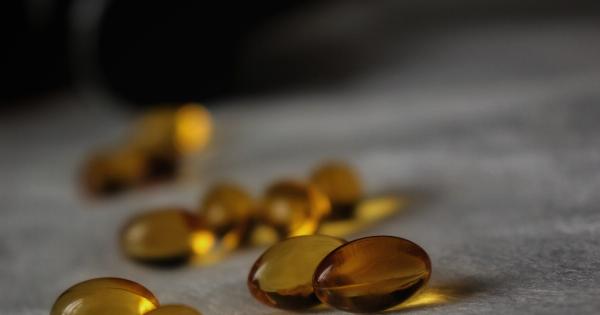Headaches can be quite debilitating, impacting your productivity and overall wellbeing. While there are several causes of headaches, nutrient deficiencies, especially in specific vitamins, can often be the underlying trigger.
In this article, we will explore the vitamins that you might be missing, which could be leading to your headaches. It’s important to note that if you frequently experience severe headaches, it is advised to consult with a healthcare professional to identify the exact cause and receive appropriate treatment.
Vitamin B2 (Riboflavin)
Vitamin B2, also known as riboflavin, plays a crucial role in converting food into energy.
It is essential for maintaining healthy brain function and preventing migraines, a type of recurrent headache often characterized by intense pain, sensitivity to light, and nausea.
Deficiency in vitamin B2 has been linked to migraines, and research suggests that riboflavin supplementation can significantly reduce the frequency and intensity of migraines.
Including foods rich in vitamin B2, such as milk, eggs, lean meats, green leafy vegetables, and nuts, in your diet can help prevent riboflavin deficiency and potentially alleviate your headaches.
Vitamin B6
Vitamin B6 is involved in the production of several neurotransmitters, including serotonin and gamma-aminobutyric acid (GABA), which play a crucial role in regulating mood and alleviating pain.
Migraine sufferers often have lower levels of serotonin, and vitamin B6 can help increase its production, potentially reducing the frequency and severity of headaches.
Good sources of vitamin B6 include fish, poultry, potatoes, bananas, and fortified cereals.
However, it is important to note that excessive vitamin B6 intake can cause nerve damage, so it is always recommended to consult with a healthcare professional before taking any supplements.
Vitamin D
Vitamin D deficiency has become increasingly prevalent, particularly among individuals who spend less time outdoors or live in areas with limited sunlight.
Research suggests that low vitamin D levels may be associated with chronic daily headaches, particularly migraines.
Vitamin D is primarily synthesized in the skin through exposure to sunlight. Foods such as fatty fish, fortified dairy products, and egg yolks are also good sources of this vitamin.
If you suspect a vitamin D deficiency, consulting with your healthcare provider and considering supplementation may be beneficial.
Magnesium
Magnesium is an essential mineral that contributes to various bodily functions, including nerve transmission and muscle relaxation. It is also involved in preventing blood vessels from constricting, a common mechanism in migraines.
Low levels of magnesium have been linked to an increased risk of migraines, and supplementation has shown promising results in reducing their frequency. Magnesium-rich foods include dark chocolate, avocados, nuts, seeds, and whole grains.
Vitamin C
Vitamin C is well-known for its immune-boosting properties, but it also plays a role in reducing oxidative stress and inflammation, which can contribute to headaches.
While vitamin C deficiency is rare in developed countries, a suboptimal intake may still affect your overall health.
Including fruits like oranges, strawberries, kiwi, and vegetables like bell peppers and broccoli in your diet can help ensure an adequate intake of this vitamin.
Vitamin E
Vitamin E is a potent antioxidant that helps protect cells from damage caused by free radicals. It also plays a role in reducing inflammation and improving blood circulation.
Some studies have suggested that vitamin E supplementation may decrease the frequency, duration, and severity of migraines, although more research is needed to establish this connection.
Good sources of vitamin E include almonds, sunflower seeds, spinach, and vegetable oils.
Omega-3 Fatty Acids
Omega-3 fatty acids, particularly eicosapentaenoic acid (EPA) and docosahexaenoic acid (DHA), are essential fats known for their anti-inflammatory effects.
A deficiency in omega-3 fatty acids has been associated with an increased risk of chronic headaches, including migraines.
Consuming fatty fish like salmon, sardines, and mackerel, as well as flaxseeds and walnuts, can help ensure an adequate intake of these beneficial fats.
Coenzyme Q10 (CoQ10)
Coenzyme Q10 is a compound produced naturally by the body and involved in energy production within cells. It also functions as an antioxidant.
Research suggests that individuals with migraines may have lower levels of CoQ10, and supplementation may help reduce their frequency and severity.
While the body can synthesize CoQ10, dietary sources like beef, chicken, fatty fish, and whole grains can also contribute to your intake.
Vitamin K2
Vitamin K2 is involved in calcium metabolism and ensuring its deposition in the bones and teeth while preventing its accumulation in soft tissues. It also has anti-inflammatory properties.
Although there are no direct studies linking vitamin K2 deficiency to headaches, research suggests that vitamin K2 may help reduce inflammation and oxidative stress, which can contribute to headaches.
Good sources of vitamin K2 include fermented foods like sauerkraut and natto, as well as meat and dairy products from grass-fed animals.
B-Complex Vitamins
While we have already discussed individual B vitamins, it’s important to emphasize the benefits of a balanced complex of B vitamins.
B vitamins work synergistically, supporting various aspects of brain function, including mood regulation and the synthesis of neurotransmitters.
Supplementing with a B-complex vitamin or ensuring a well-rounded diet that includes foods like whole grains, legumes, leafy greens, and animal products can help prevent deficiencies and possibly alleviate headaches.
It’s crucial to remember that nutritional deficiencies may not be the sole cause of your headaches, and various factors can contribute to their occurrence.
If you experience frequent, severe, or persistent headaches, it is essential to consult with a healthcare professional to determine the underlying cause and develop an appropriate treatment plan.































